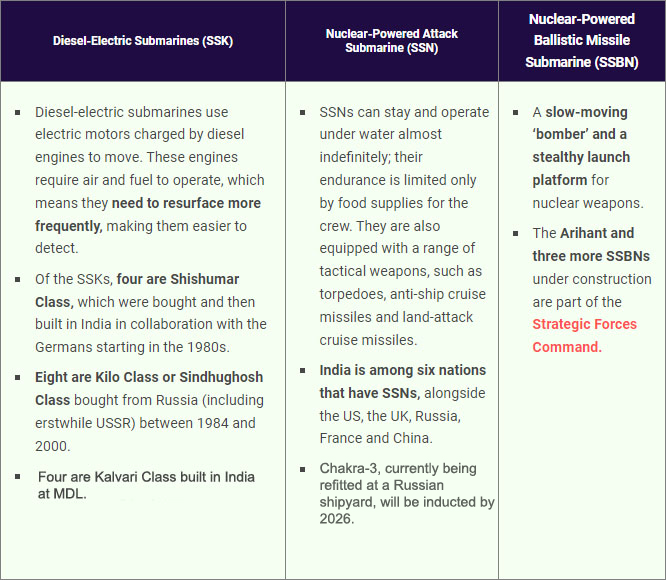Air Independent Propulsion Technology | 04 May 2022
Why in News?
Recently, France’s Naval Group declined the bid for the P-75I Project, citing it does not use AIP (Air-Independent Propulsion) Technology yet.
- Around 10 countries have developed or are close to building AIP technology, and almost 20 nations have AIP submarines.
What is the P-75I project?
- In June 1999, the Cabinet Committee on Security approved a 30-year plan for the Navy to indigenously build and induct 24 submarines by 2030.
- In the first phase, two lines of production were to be established — the first, P-75; the second, P-75I. Each line was to produce six submarines.
- While the six P-75 submarines are diesel-electric, they can be fitted with AIP technology later in their lives.
- This P-75I project envisages indigenous construction of submarines equipped with the state-of-the-art Air Independent Propulsion system at an estimated cost of Rs. 43,000 crore.
What is AIP?
- About:
- AIP is a technology for conventional non-nuclear submarines.
- Submarines are essentially of two types: conventional and nuclear.
- The conventional submarines use diesel-electric engines, which require them to surface almost daily to get atmospheric oxygen for fuel combustion.
- If fitted with an AIP system, the submarine will need to take in oxygen only once a week.
- The indigenously developed AIP, which is one of the key missions of the Naval Materials Research Laboratory (NMRL - DRDO), is considered one of the ambitious projects of the DRDO (Defence Research and Development Organisation) for the Navy.
- Fuel Cell Based AIP system:
- In a fuel cell based AIP, an electrolytic fuel cell releases energy by combining hydrogen and oxygen, with only water as the waste product ensuring less marine pollution.
- The cells are highly efficient, and do not have moving parts, thus ensuring that the submarine has a low acoustic emission of sound.
What are the Advantages and Disadvantages of AIP?
- Advantages:
- AIP has a force multiplier effect on lethality of a diesel electric submarine as it enhances the submerged endurance of the boat several fold.
- Fuel cell-based AIP has merits in performance compared to other technologies.
- AIP technology allows a conventional submarine to remain submerged for much longer than ordinary diesel-electric submarines.
- All conventional submarines have to surface to run their generators that recharge the batteries that allow the boat to function under water.
- However, the more frequently a submarine surfaces, the higher the chances of it being detected.
- AIP allows a submarine to remain submerged for more than a fortnight, compared to two to three days for diesel-electric boats.
- Disadvantages:
- Installing AIP increases the length and weight of the boats, requires pressurised liquid oxygen (LOX) storage on-board and supply for all three technologies.
- MESMA (Autonomous Submarine Energy Module) and the Stirling engine have some acoustic noise from moving parts; and the submarine’s unit cost increases by around 10%.
What submarines does India have now?
- India has 16 conventional diesel-electric submarines, which are classified as SSKs. After the last two Kalvari Class subs are commissioned under P-75, this number will go up to 18.
- India also has two nuclear ballistic submarines, classified SSBN (Submersible Ship Ballistic Missile Nuclear).
- By the time P-75I is completed under the 30-year project, India is projected to have six diesel-electric, six AIP-powered, and six nuclear attack submarines.
UPSC Civil Services Examination, Previous Year Questions
Q. Which one of the following is the best description of ‘INS Astradharini’, that was in the news recently? (2016)
(a) Amphibious warfare ship
(b) Nuclear-powered submarine
(c) Torpedo launch and recovery vessel
(d) Nuclear-powered aircraft carrier
Ans: (c)

